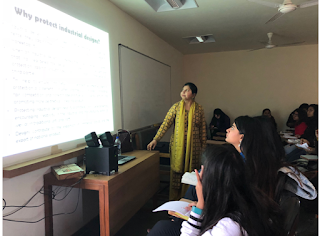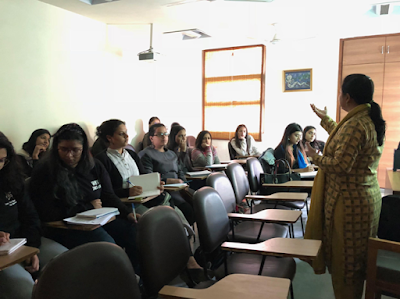 |
| Faculty of Journalism Dept. with Ms. Archana Kumari (second from left) |
The Department of Journalism, LSR, hosted a guest lecture with Ms. Archana Kumari, on 15th February 2018, on the topic – Intellectual Property Rights (IPR). Having over 10 years of rich experience in the field of journalism as an academician, Ms. Kumari imparted valuable insights and exceptional knowledge to the students, who asked her relevant questions which made the lecture interactive as well as fun.
Ms. Kumari started the lecture by asking the students what they understood by Intellectual Property Rights, and proceeded by explaining the concept to the curious minds. Emphasising on the intangible aspect of IPR, Ms. Kumari reiterated that the original curator of any idea must get due credit, and hence the need for IPR. Categorising the concept further, she explained what was meant by Industrial Property Patents and Copyrights literacy.
The lecture proceeded with Ms. Kumari talking about patents and their importance. Exclusive rights granted for inventions, including scientific innovations, are patents. She then talked about Product Patents and Process Patents. The former, as ma’am described, existed earlier too, however, the need for patenting processes was felt when people started making minute changes to already existing goods and started selling them as their own. A befitting example of this form of plagiarism are the drugs and pharmaceutical companies. Talking about the duration of patents, she asserted that any product can be patented for a maximum of 20 years, after which the holder of the patent has to relaunch the product with certain changes or, alternatively, can renew their patent but only if nobody else has come up with a new invention in a similar product. Further, the students also learned the conditions necessary for any product to be patented, which are primarily worthiness, newness, inventiveness and novelty.
Talking about trademarks and their importance, Ms. Kumari described them as the most visual distinctive design for any product/ service/ business/ media house etc, and also intrigued the students by presenting the statistics for the number of people that apply for trademarks every year, which was an exuberant 3 million. She then went on to explain the concept of ‘Product Disparagement’ by simply giving the example of Reebok (which was the original brand) and Reebuk (which is a clone brand of the existing sports goods pioneer, Reebok).
The lecture ended with an intriguing discussion on copyrights and their importance. The moment one innovates an idea, they hold its copyrights by default. One only needs proof of their invention, and the best way to copyright a material was to email it to oneself as soon as the idea is curated. In India, one holds the copyright to their invention for 60 years, which is 10 years more than the global scenario. The lecture turned out to be a learning experience for the students of the department.
– Written by Paridhi Bhanot, student of Journalism, LSR





No responses yet